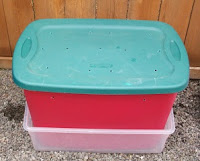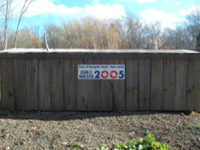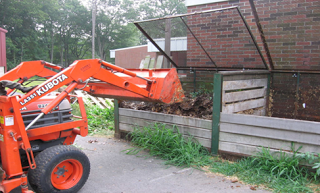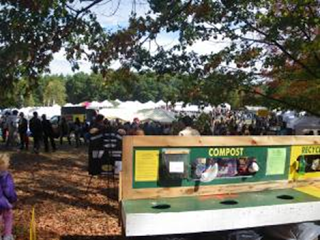June 11, 2013
Through NERC’s “Best Management Practices for Organics & Debris Management in Rural Towns in Maine, New Hampshire, New York, and Vermont” we are providing webinars, workshops, resources, and technical assistance.
This article continues our ongoing blog series about organics management, with additional low-cost composting options.
Worm Composting
 Worm composting or "vermicomposting" is a process using worms (“red wigglers”) to convert organic material into a dark rich soil amendment. It presents an opportunity for low cost food scrap diversion. The worm castings or “vermicompost” created in the process can be used in gardens, outdoor landscaping, and indoor plantings. Vermicomposting can be done at home, school, institutions, businesses, as well as on a farm or commercial scale. In nature, worms can consume their own weight in organic material daily and leave behind the richest and most productive soil known.
Worm composting or "vermicomposting" is a process using worms (“red wigglers”) to convert organic material into a dark rich soil amendment. It presents an opportunity for low cost food scrap diversion. The worm castings or “vermicompost” created in the process can be used in gardens, outdoor landscaping, and indoor plantings. Vermicomposting can be done at home, school, institutions, businesses, as well as on a farm or commercial scale. In nature, worms can consume their own weight in organic material daily and leave behind the richest and most productive soil known.
Worms will eat virtually any type of grains, vegetables, and fruit. Worm bedding is made from cardboard or shredded paper; it can also be made from manure, straw, and similar materials. Worm bins can be easily made from plastic bins (7–14 gallon) or built from wood. Bins can be kept indoors (e.g., basement or garage) or outside, however the worms must be kept from freezing and in temperatures below 80 F°.
In the classroom, worm composting is an easy, inexpensive and practical way to help students learn about science and the environment. Introducing students to worm composting is a way to help create knowledge about other forms of composting that can be done at home and the important role that composting can play in waste reduction and soil formation.
Neighborhood Composting Programs
 Community or neighborhood compost sites are more common in urban areas, often associated with community gardens. However, these decentralized systems can provide residents in rural and small town areas with another low-cost composting option. Community composting can particularly benefit the elderly and others who may have difficulty managing a home composting system, as well as those with limited yard space.
Community or neighborhood compost sites are more common in urban areas, often associated with community gardens. However, these decentralized systems can provide residents in rural and small town areas with another low-cost composting option. Community composting can particularly benefit the elderly and others who may have difficulty managing a home composting system, as well as those with limited yard space.
As with home composting, neighborhood composting allows for effective organics management with minimal costs. Materials are still handled close to where they are generated, although residents need to transport materials to the site. Neighborhood composting sites allow residents to share the experience of composting, gain the benefits of making compost for community garden efforts, and help to foster more environmental awareness in the community.
School Composting
 Every school day each student generates two pounds or more of compostable material, such as food scraps and soiled paper. Composting these materials can help schools significantly reduce their waste while providing educational opportunities for students. Removal of organics from the school waste stream can result in up to a 95% reduction in cafeteria wastes. Of course, organics diversion in schools presents many hurtles, especially in small towns and rural communities. Many schools do not have access to an offsite compost facility, while on-campus composting can be difficult to sustain without dedicated support and diligent maintenance.
Every school day each student generates two pounds or more of compostable material, such as food scraps and soiled paper. Composting these materials can help schools significantly reduce their waste while providing educational opportunities for students. Removal of organics from the school waste stream can result in up to a 95% reduction in cafeteria wastes. Of course, organics diversion in schools presents many hurtles, especially in small towns and rural communities. Many schools do not have access to an offsite compost facility, while on-campus composting can be difficult to sustain without dedicated support and diligent maintenance.
A suitable school composting system depends on a variety of factors, including whether there are available offsite services (processing and hauling) or an onsite area suitable for composting; the amount of food waste generated; available staffing or volunteers; and, the student body size and age. Schools can collect materials for processing at an offsite composting facility, for animal feed, or a farm digester operation. Alternatively, organics can be managed in an onsite composting site using outside compost bins or pile; with worm composting bins either in classrooms or outside; or by using an in-vessel composting unit (a commercial system more commonly employed at larger institutions).
 Formation of a school “compost team” and coordinator can help to ensure composting success. The team should include representatives from administration, teachers, custodial and cafeteria staff, parents, and students. The team would be responsible for program development, ensuring that there is administrative, staff, and student support for the program, and overseeing the composting efforts. Onsite composting can be done with commercially available backyard compost bins or constructed bins.
Formation of a school “compost team” and coordinator can help to ensure composting success. The team should include representatives from administration, teachers, custodial and cafeteria staff, parents, and students. The team would be responsible for program development, ensuring that there is administrative, staff, and student support for the program, and overseeing the composting efforts. Onsite composting can be done with commercially available backyard compost bins or constructed bins.
Special Events Composting
As much as half (or more) of the special event waste stream is compostable. Virtually all communities—from small towns to large cities—have special events. Whether a block party or music festival, events offer a perfect opportunity for hands-on education about composting. Special events present a microcosm of our society. People gather, they do activities together, and they generate waste.
Composting can be successful at virtually any type of special event. Events frequently offer recycling, a very laudable undertaking. However, taking that next step—to implement collection of compostables—often seems daunting. Admittedly, the tasks to implementing successful event composting are often unfamiliar and can be challenging—finding a hauler, securing more volunteers, and convincing vendors to only use compostable service ware. Composting at special events doesn’t usually happen without extremely dedicated organizers or outside “intervention” from solid waste experts…and, often both!
 Typically special event composting requires an off-site processor of food scraps and soiled paper. Some agricultural fairs may be able to integrate these organics into an onsite manure composting operation if this is well managed. Depending on the size of the event a hauler will be needed. Smaller events may be able to work with the processor or volunteers to provide hauling. Materials to be diverted could include pre- and post-consumer food, as well as compostable flatware, plates, packaging, and napkins. Fairs with livestock shows can partner with municipal, farm, or private compost operations to also handle manure and bedding. Events may want to consider a policy on vendors’ use of compostable service ware. Containers will need to be obtained for collection. Integrating the compost collection with recycling and solid waste will help to ensure success.
Typically special event composting requires an off-site processor of food scraps and soiled paper. Some agricultural fairs may be able to integrate these organics into an onsite manure composting operation if this is well managed. Depending on the size of the event a hauler will be needed. Smaller events may be able to work with the processor or volunteers to provide hauling. Materials to be diverted could include pre- and post-consumer food, as well as compostable flatware, plates, packaging, and napkins. Fairs with livestock shows can partner with municipal, farm, or private compost operations to also handle manure and bedding. Events may want to consider a policy on vendors’ use of compostable service ware. Containers will need to be obtained for collection. Integrating the compost collection with recycling and solid waste will help to ensure success.
Next up – opportunities, action, and case study examples for home, school, and special event composting.
By Athena Lee Bradley


Comments (0)
Add a Comment